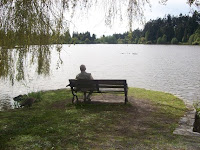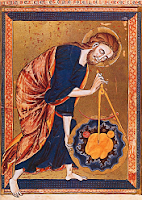
On this special occasion and landmark of my blog - it is the centennial entry - I would like to point out the importance of the reader in this blogger relationship.
Without the reader, the blog would not exist. The purpose of blogs, its raison d'être, is to have a readership following its posts. Of course, it is also beneficial for the author to gain personal satisfaction by simply producing articles and by honing one's craft, but it is published in cyberspace for the main reason of being read and possibly commented upon.
Some writers say they do not care about readership and are validated by the art of writing itself. That may be so, but it seems a contradiction in existential terms. Even if you produce a text for your eyes only, you are indeed a reader yourself. A text cannot exist without its reader; otherwise it is no different from a blank sheet of paper.
Similarly, a person cannot live, or rather exist, without a social context. For existence, we need the other to confirm our existence in the world, for them to see, acknowledge and react to us. In other words, each of us is a text that needs to be read and deciphered by other people in order to exist.
As a result, dead or invisible people do not exist unless you are a medium or you happen to think of them. I am also aware that following my argument, Robinson Crusoe would not exist. And yet he does. He simply exists through the fact that the reader reads about his adventures. By picturing and imagining him in our minds through the act of reading, he comes to life each time we grab the book and read his text. If he were unknown to us, he would cease to exist.
In psychological terms, we are all endowed with a personality – or so they say. But you still need the other to differentiate yourself from in order to have a personality to begin with. Another person needs to recognize you as having certain characteristics, such as humor, intelligence, or patience. No matter how funny you may think you are, if you do not make anybody laugh, you are not funny. We need the other to validate or refute us.
Likewise, in a world where everybody is good and honest, evil and deceit would not exist. The fact then that you are good means really nothing because so is everybody else. In this case, we need the other, as our opposite pole to help us set us apart from them. The definition of good is the counterpoint and negation of evil, the yin and yang.
To return to our first proposition, I want to thank all my readers for helping my blog – and me – to come into being. If I say it would not exist without you, I mean it ... literally.

